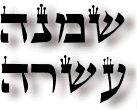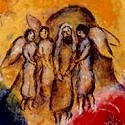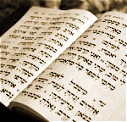|
The Shemoneh Esrei...
The Amidah is also called Shemoneh Esrei, which means "eighteen" (8+10), since originally there were eighteen blessings of the Amidah divided into three general types:
- Praise - The first three blessings: Avot, Gevurot, and Kedushat HaShem.
- Petitions - The next thirteen blessings (middle section): Da'at, Teshuvah, Selichah, Ge'ulah, Refu'ah, Birkat Hashanim, Kibbutz Galuyot, Birkat HaDin, Birkat HaMinim, Tzaddikim, Binyan Yerushalayim, Malkhut bet David, and Kabbalat Tefilah.
- Thanks - The last three blessings: Avodah, Hoda'ah, and Sim Shalom.
Notice that this lists adds up to nineteen, not eighteen. The reason for this was that an additional "blessing" was added later, but the name Shemoneh Esrei was retained. For this reason it is more straightforward to refer to the Shemoneh Esrei as the "Amidah" (standing) or "the Tefillah" (the prayer). After reciting all of these berachot, there is a concluding prayer said for the entire ceremony.
Two Basic Versions...
- The Weekday version consists of the full nineteen blessings of praise, petition, and thanksgiving to God.
- The Sabbath and Holiday versions are abbreviated to just seven blessings (the first and last three blessings are the same as the weekday version, but the middle thirteen blessings are reduced to a single blessing appropriate for the holy day).
Reciting the Amidah...
Most Jews face the Aron Kodesh and take three steps backward, and then three steps forward before before (quietly) reciting the Amidah. Note that the blessings should be recited while standing, with quiet devotion and without interruption. Whenever there is a minyan (group of ten) present, the Amidah will be repeated aloud (by the cantor) in the synagogue, and the congregant responds "Amen" after each blessing has been recited.

Part I: Blessings of Praise
- Avot (Fathers)
- Gevurot (God's Might)
- Kedushat HaShem (Holiness of God's Name)
Part II: Blessings of Petition
- Da'at (Knowledge)
- Teshuvah (Repentance)
- Selichah (Forgiveness)
- Geulah (Redemption)
- Refuah (Healing)
- Birkat Hashanim (Prosperity)
- Kibbutz Galuyot (Ingathering of Exiles)
- Birkat HaDin (Call for Justice)
- Bikat HaMinim (Against Slander)
- Tzaddikim (Righteous Ones)
- Binyan Yerushalayim (Rebuilding Jerusalem)
- Malkhut beit David (Kingdom of David)
- Kabbalat Tefillah (Acceptance of Prayer)
Part III: Blessings of Gratitude
- Avodah (Worship)
- Hoda'ah (Thanksgiving)
- Sim Shalom (Granting of Peace)
Downloads:
<< Return
|




